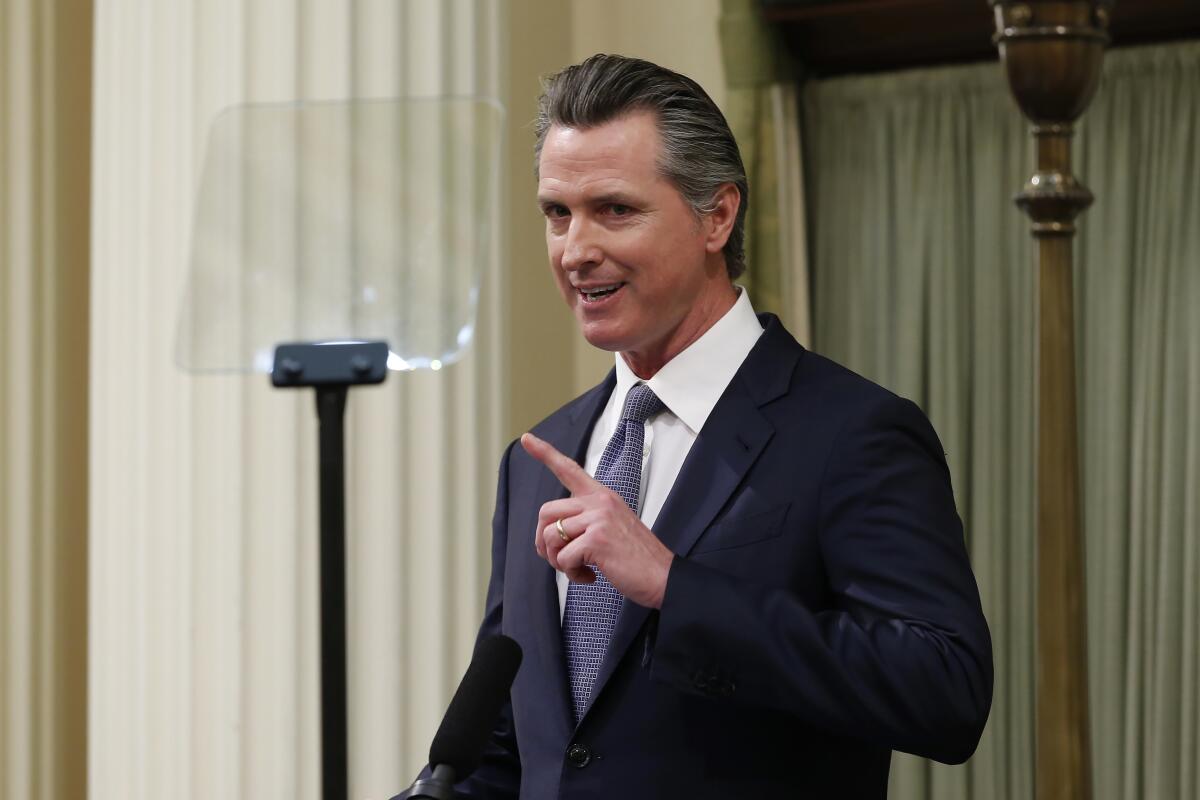Newsom wants to shape AI’s future. Can California lead the way?

- Share via
California Gov. Gavin Newsom on Wednesday signed an executive order directing state agencies to examine the benefits and risks of artificial intelligence that can generate text, images and other content.
The executive order sets the stage for potential regulation around what’s known as generative AI technology, which has already raised concerns about misinformation, plagiarism, bias and child safety. The governor and California lawmakers thus far have been cautious about regulating technology they might not fully understand and hindering business innovations that fuel the state’s economy.
“We recognize both the potential benefits and risks these tools enable. We’re neither frozen by the fears nor hypnotized by the upside,” Newsom said in a statement. “We’re taking a clear-eyed, humble approach to this world-changing technology.”
Tech companies including Microsoft, Google and Facebook parent company Meta have been scrambling to incorporate generative AI in their products as firms, such as OpenAI, release popular tools such as ChatGPT. AI has the potential to transform various industries, including state government and politics.
The executive order outlines steps state agencies can take to better understand AI. Under the order, the California Department of Technology, the Office of Data and Innovation, and other state agencies must examine the most significant and beneficial ways generative AI can be used by the state within 60 days. The governor also ordered the agencies to look at potential AI risks to individuals, communities and state workers. They have until January 2024 to issue guidelines for the procurement, uses and training required for use of generative AI.
Darrell West, senior fellow at the Center for Technology Innovation within the Governance Studies program at the Brookings Institution, said the executive order was comprehensive and could influence action taken by other states.
“California has long been a trendsetter, and the governor’s executive order is continuing that tradition on AI,” West said. “If one large state makes a major movement it’s going to force the tech companies to come along, whether they want to or not.”
Child safety groups such as the nonprofit Common Sense Media say that they see the executive order as a first step but that lawmakers will need to pass legislation to combat AI’s risks, including child sexual abuse imagery. These safety issues will only be “exacerbated by AI,” said Jim Steyer, chief executive of Common Sense Media.
“We have to put major protections and guardrails in place and you have to do that legislatively,” he said.
The executive order comes before tech executives including OpenAI CEO Sam Altman, Meta CEO Mark Zuckerberg, Google CEO Sundar Pichai, Tesla CEO Elon Musk and others are expected to head to Washington next week for an AI forum hosted by Senate Majority Leader Charles E. Schumer (D-N.Y.).
Newsom has previously signaled that he’s cautious about AI regulation. At a Los Angeles conference in May, he said that “the biggest mistake” politicians can make is asserting themselves “without first seeking to understand.” Newsom also participated in an AI roundtable in June with President Biden, whose administration has met with tech executives and released a “Blueprint for an AI Bill of Rights.”
Newsom’s office said the governor wasn’t available for an interview. He told Bloomberg he thought there was a “Pandora’s box” being opened with generative AI and the state wants “it done in a safe way.”
Peter Leroe-Muñoz, general counsel and senior vice president for technology and innovation at the Silicon Valley Leadership Group, said he was pleased that the governor’s office has been engaging with tech companies and other interested parties. AI, he said, has the potential to make government work more efficient and effective and services more accessible to Californians.
“This executive order really shows that the governor is placing California in the driver’s seat as we road map AI’s future in America,” he said.
More to Read
Get the L.A. Times Politics newsletter
Deeply reported insights into legislation, politics and policy from Sacramento, Washington and beyond. In your inbox twice per week.
You may occasionally receive promotional content from the Los Angeles Times.











